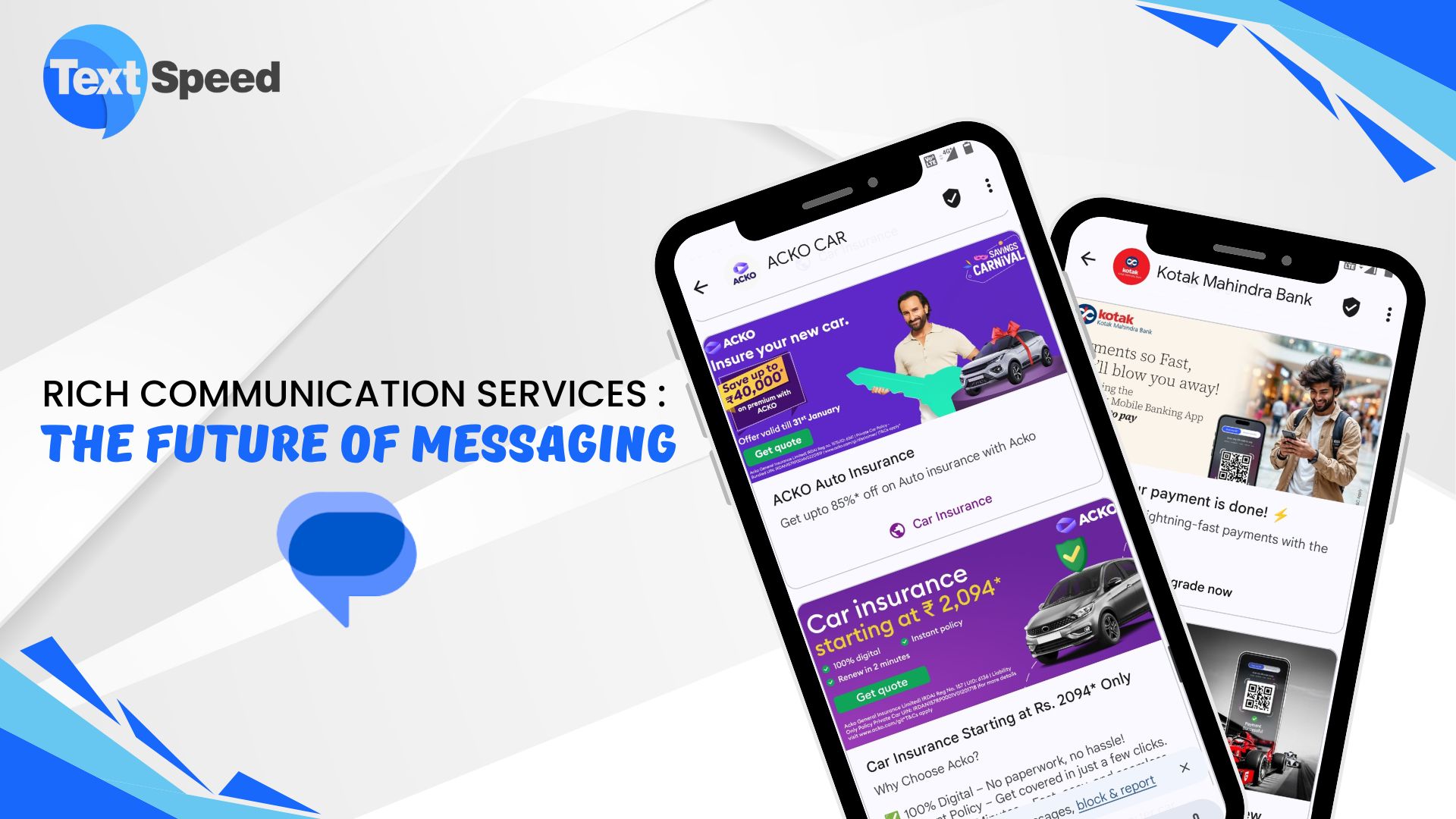Introduction
Rich Communication Services (RCS) is redefining the landscape of mobile messaging by introducing an advanced, interactive, and media-rich experience within the native messaging app. Considered the next evolution of SMS, RCS enables real-time engagement and supports rich media formats, providing users and businesses with seamless communication without depending on external applications.
In a world that values instant, visual, and interactive communication, Rich Communication Services stands as a bridge between traditional text messaging and modern chat platforms. For businesses, it creates new opportunities to enhance customer engagement, deliver branded experiences, and build trust through verified messaging.
Why Rich Communication Services Are Transforming Modern Messaging
Unlike conventional SMS, which limits businesses to plain text, RCS empowers communication through enhanced features such as image sharing, typing indicators, read receipts, and interactive media buttons. These features are integrated directly into a smartphone’s default messaging app, ensuring convenience and accessibility.
For enterprises, this evolution translates into a powerful marketing and communication tool — one that merges personalization, interactivity, and automation. Businesses can now send rich promotional messages, offer real-time support, and enable one-tap actions such as payments or bookings — all within the chat interface.
The Rise of RCS: Shaping the Next Era of Communication
The rapid adoption of Rich Communication Services is changing how users and businesses communicate. Here’s what drives this transformation:
-
Enhanced User Experience: RCS delivers a visually appealing and fluid messaging experience with high-quality media, carousels, and conversational buttons.
-
Brand-Friendly Platform: Businesses can design interactive, app-like campaigns that boost engagement and brand recall.
-
Seamless Accessibility: Since RCS operates through the phone’s native messaging app, there’s no need for customers to download additional software.
-
Widespread Adoption: With increasing support from mobile carriers, OEMs, and Google’s ecosystem, RCS is becoming a global standard in messaging.
Core Features That Redefine Messaging
RCS introduces a suite of next-generation messaging capabilities once limited to third-party platforms:
-
Rich Media Sharing: Send videos, product images, GIFs, and documents in superior quality.
-
Real-Time Indicators: Typing indicators and read receipts provide instant engagement cues.
-
Group Messaging: Manage collaborative communication across teams and customer segments.
-
Verified Business Profiles: Build customer trust through authenticated business identities.
-
Interactive Elements: Add buttons, carousels, and CTAs for an app-like experience within the chat.
How Rich Communication Services Empower Businesses
RCS is rapidly becoming a strategic asset for businesses that want to modernize their customer communication. Here’s how it’s making an impact:
-
Interactive Marketing Campaigns: RCS allows brands to launch visually engaging promotions with clickable CTAs, carousels, and product showcases.
-
Conversational Commerce: Customers can explore products, make purchases, and receive order confirmations within the same chat window.
-
App-Free Experience: Businesses can engage users without asking them to install separate apps, reducing friction and increasing reach.
-
Brand Trust & Security: Verified senders and carrier-level authentication reinforce credibility.
-
Competitive Advantage: Early adopters of Rich Communication Services benefit from higher engagement rates and improved customer loyalty.
Challenges in RCS Adoption
Despite its growing popularity, Rich Communication Services faces certain challenges before achieving mass adoption:
-
Limited Carrier Coverage: Some telecom networks still lack full RCS functionality, resulting in uneven accessibility.
-
Internet Dependency: Since RCS requires an internet connection, users in low-connectivity areas may face disruptions.
-
Device Inconsistencies: Not all smartphones support RCS uniformly, leading to fragmented user experiences.
-
Privacy Concerns: The absence of universal end-to-end encryption remains a challenge for sensitive communications.
-
Implementation Costs: Small and medium-sized businesses may need to invest in technical integration and RCS APIs.
Telecom Operators: The Driving Force Behind RCS Growth
Telecom providers play a crucial role in the expansion of Rich Communication Services by modernizing network infrastructure and collaborating with brands. Their contributions include:
-
Infrastructure Development: Upgrading systems to ensure RCS reliability and high-speed delivery.
-
Enterprise Partnerships: Assisting businesses in integrating RCS into CRM, support, and marketing tools.
-
Consumer Awareness: Educating users about the value and capabilities of RCS messaging.
-
Innovative Use Cases: Launching solutions such as appointment reminders, surveys, and two-way chatbots powered by RCS.
-
Verification & Security: Enforcing business verification to maintain trust and prevent spam or impersonation.
Public Perception: The Shift Toward Rich Messaging
Consumers are gradually embracing RCS as they experience its superior interface and real-time interaction capabilities. However, perceptions vary:
-
Positive Engagement: Users appreciate its app-like, interactive design and intuitive usability.
-
Privacy Awareness: Concerns remain regarding encryption and data handling by telecom operators.
-
Competition with OTT Apps: RCS competes with platforms like WhatsApp and Telegram, which already have established ecosystems.
-
Awareness Gap: Many users are still unaware that their default messaging app supports RCS capabilities.
RCS in Marketing: Redefining Customer Engagement
RCS has become a key tool in modern marketing strategies, offering dynamic, measurable, and personalized communication.
-
Immersive Campaigns: Combine multimedia elements, CTAs, and carousels to create interactive brand experiences.
-
Personalized Messaging: Send targeted offers based on customer data and preferences.
-
Higher Engagement Rates: RCS messages often outperform SMS in open and interaction rates.
-
Instant Transactions: Allow users to make bookings or purchases without leaving the conversation.
-
Performance Analytics: Track engagement in real time to refine future marketing efforts.
Conclusion: The Road Ahead for Rich Communication Services
Rich Communication Services is no longer an emerging technology — it’s a revolution in the making. By merging the reliability of SMS with the interactivity of chat platforms, RCS provides a powerful channel for businesses to connect, engage, and convert customers.
As network support expands and awareness grows, businesses that adopt RCS early will enjoy stronger customer relationships, higher engagement, and improved marketing ROI. The future of mobile communication is here — and it’s rich, dynamic, and personal.


